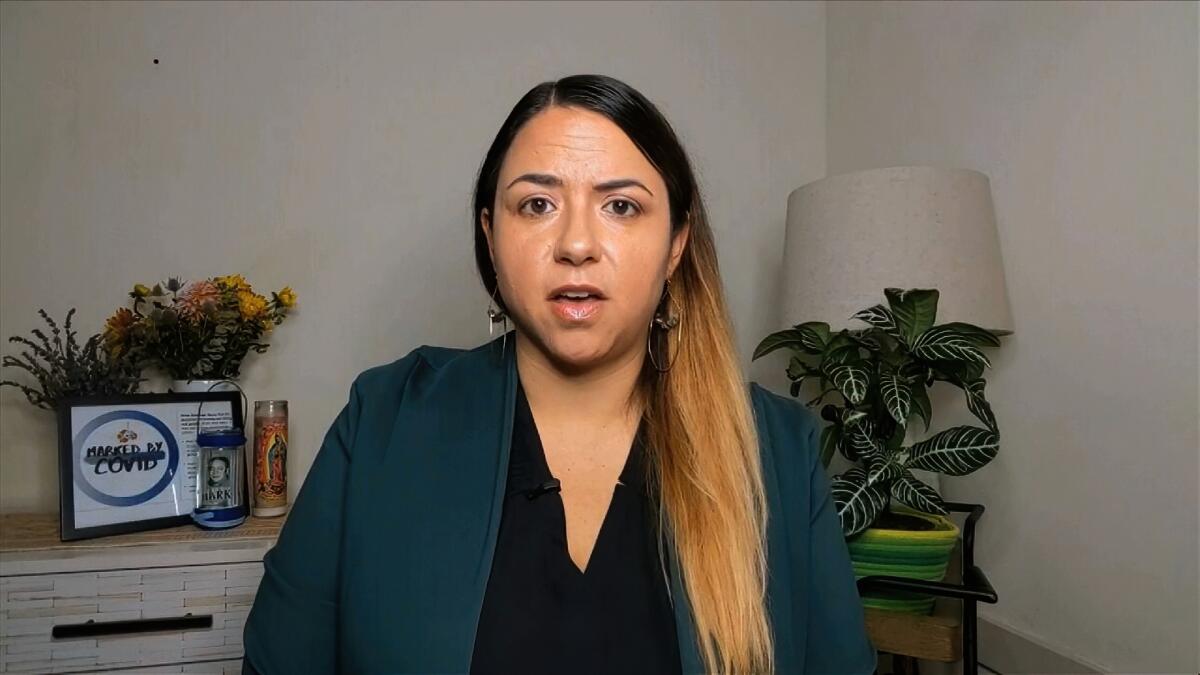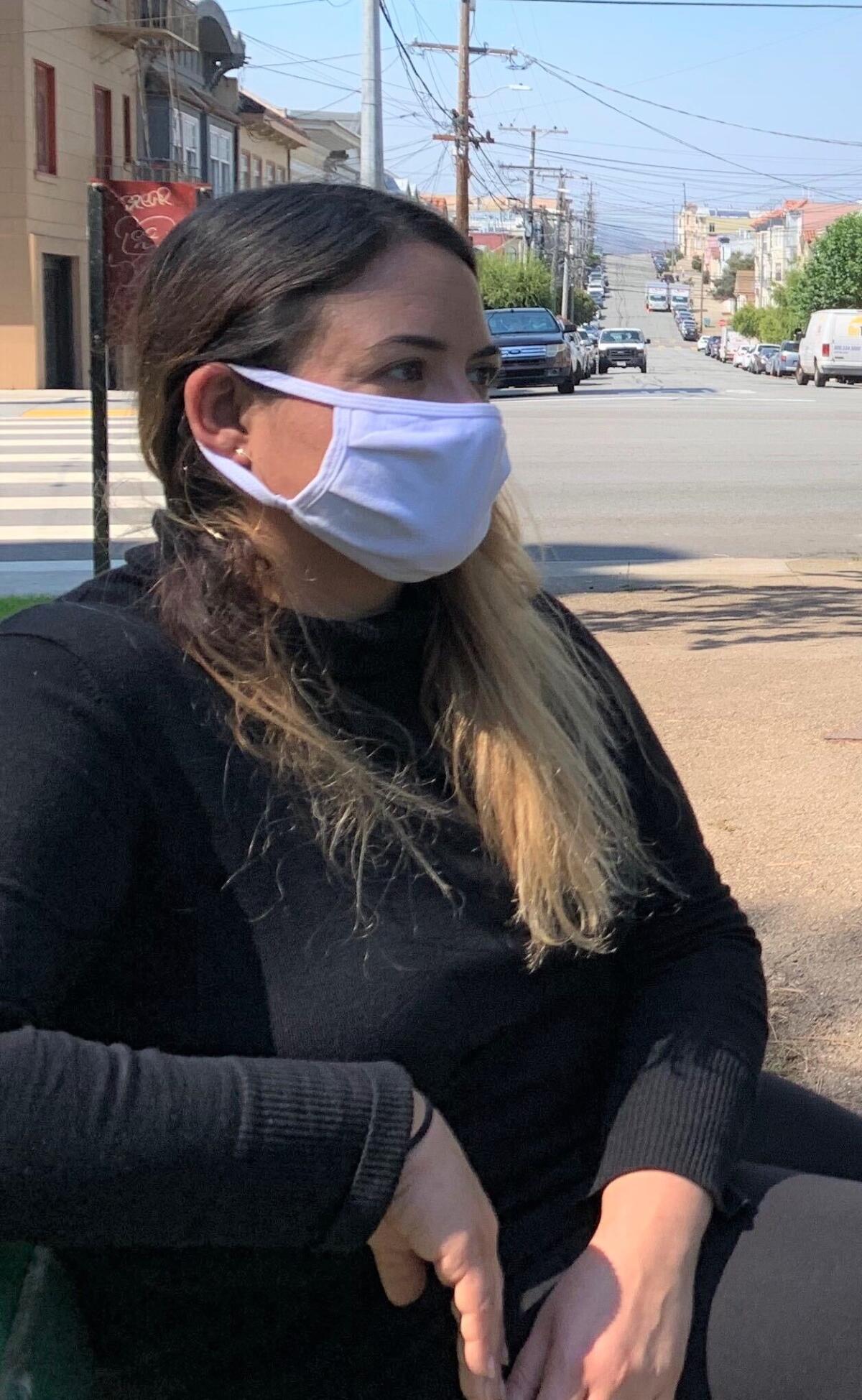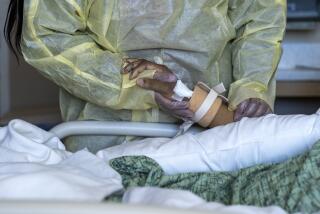She ripped Trump for her dad’s COVID-19 death. She hopes her fame will drive change

SAN FRANCISCO — Few people are as prepared for overnight notoriety as Kristin Urquiza.
On Monday, the San Francisco woman skyrocketed to further fame during a three-minute televised segment of the Democratic National Convention.
In her debut on the national stage, Urquiza issued a scathing condemnation of President Trump, blaming him for the spread of the coronavirus that killed her father more than six weeks earlier in Arizona.
“My dad was a healthy 65-year-old,” she said on the broadcast. “His only preexisting condition was trusting Donald Trump, and for that he paid with his life.”

Urquiza’s road to the convention started after her father died and she penned a letter to the Arizona Republic, her father’s hometown newspaper. The 39-year-old social justice advocate wanted her natal community and city to know her dad didn’t have to die. She thinks he would still be alive if Trump and Arizona Gov. Doug Ducey had not downplayed the severity of the coronavirus, relaxed shelter-in-place rules and suggested the disease was a hoax.
Her father had believed them.
“He shouldn’t have died,” she said Thursday afternoon, sitting on a park bench in Golden Gate Park, across the street from the apartment she shares with her partner and now communications manager, Christine Keeves.
Until she received an unexpected call from convention organizers, Urquiza said she had no aspirations of addressing a national audience in the service of Joe Biden’s presidential bid. But when her moment came, she was prepared for it — and also the inevitable fallout.
Trump supporters have told her they are glad her father died. But she’s also been praised for sharing her family’s harrowing story.
“It was a powerful expression of how COVID is personally tearing people apart,” said Rob Stutzman, a Sacramento-based GOP political consultant and Trump critic.
Although Stutzman doubts Urquiza’s story will move many swing voters to Biden’s side, her “personal testament had great magnitude,” he said, that likely resonated with millions of Americans.
Urquiza grew up in Maryvale, a community outside of Phoenix populated almost entirely by Mexican and Latin American immigrants. Her parents, both born in the U.S., were the children of migrant agricultural workers. Her dad, Mark Anthony Urquiza, worked in the fields as a teen and young man.

She was an only child, and her parents raised her, she said, to believe in herself and not be afraid to use her voice. An exceptional student, she earned a spot at Yale University, and in August 1999, she purchased a $69 one-way ticket to New Haven, Conn., on a Greyhound bus.
“I figured that’s how most people got there,” she said.
She was wrong. The world that greeted her at the elite, Ivy League institution was more foreign and intimidating than anything she could have imagined.
“It wasn’t like I’d trained for softball and ended up playing football,” she said. “It was like I’d trained for softball and ended up in a different galaxy where nothing made sense, and I was the only one who didn’t get it.”
She found the adjustment difficult, and for the first time in her life, she largely kept her mouth shut and listened. But she gradually made friends and connections through the university’s children’s theater — a program for the underserved communities and people of New Haven.
It was at Yale that she first became acutely aware of what she described in her speech as two different worlds — universes occupying the same space, but operating in parallel.
There was one in which people knew how to operate the systems around them with power, influence, money and social connections. And then there was the other, filled with people like her, who were denied or didn’t have access to change, manage or influence these systems.
Since graduating in 2003, she’s been an advocate for social and environmental justice — building a career around mobilizing others to address and change inequities, from her adopted San Francisco to the Amazon.
During the winter, she said, she’d been actively campaigning to conserve rainforests, highlighting the dangers that deforestation poses for human health — releasing and spreading novel diseases.
“The timing was weird,” she said, because it was at this time that the first reports of the coronavirus began trickling in from China.
“I was terrified,” she said. And she made sure to warn her parents as the disease began to spread.
In early June, however, he contracted the disease, shortly after visiting a karaoke bar with friends following Arizona’s lifting of the stay-at-home order. He died after five days on a ventilator, alone.
Stricken by grief and enraged by what she saw as reckless misinformation from political leaders, Urquiza penned her father’s obituary to run the day of his funeral. She invited the governor to attend, as well as representatives from the Arizona Republic. None of them, she said, responded.
But one man saw her obituary and posted it on Twitter. The following day, Urquiza’s phone was “blowing up,” she said. She had hundreds of voicemails, emails and social media tags — including requests for appearances from CNN and the “Today” show.
A savvy activist, she recognized the national platform she’d been given and decided to use it: She and her partner, Keeves — a communications specialist — have started an organization, markedbycovid.com, to represent and advocate for people who’ve been hit by COVID-19. These include the survivors, the ones left behind and essential workers — such as teachers — who are at risk of getting it.
They’ve already begun a campaign in Iowa, in which schoolteachers have written their own obituaries and sent them to local newspapers — in anticipation of getting the disease.
“This is a growing demographic,” Urquiza said. As governments implement policies and relief packages in the coming months and years, “They need to have a seat at the table.”
“This disease isn’t going away,” Urquiza added. “It’s here to stay.”
More to Read
Get the L.A. Times Politics newsletter
Deeply reported insights into legislation, politics and policy from Sacramento, Washington and beyond. In your inbox three times per week.
You may occasionally receive promotional content from the Los Angeles Times.











